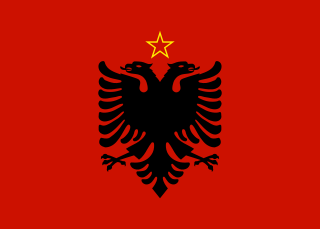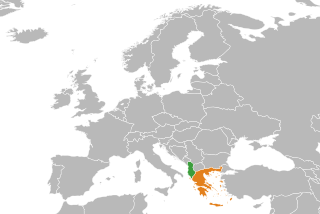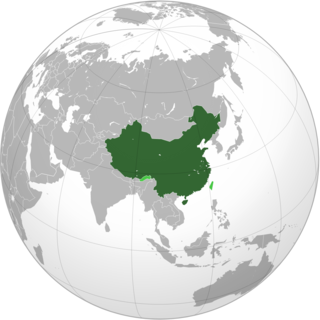Related Research Articles

Enver Halil Hoxha was an Albanian communist politician who was the authoritarian ruler of Albania from 1944 until his death in 1985. He was First Secretary of the Party of Labour of Albania from 1941 until his death in 1985. He was also a member of the Politburo of the Party of Labour of Albania, chairman of the Democratic Front of Albania, and commander-in-chief of the armed forces and ruled the country from 1944 until his death in 1985. He was the 22nd Prime Minister of Albania from 1944 to 1954 and at various times was both foreign minister and defence minister of the People's Socialist Republic of Albania.

As one of the oldest Euro-Atlantic member states in the region of Southeast Europe, Greece enjoys a prominent geopolitical role as a middle power, due to its political and geographical proximity to Europe, Asia, the Middle East, Africa, the Americas and Australia. Its main allies are the United States, the United Kingdom, France, Italy, Israel, Cyprus and the rest of the European Union, NATO and UN.
The foreign relations of Albania are its relations with other governments and peoples. Foreign relations are conducted through the Ministry of Foreign Affairs in Tirana. The current minister is Olta Xhaçka. The current Ambassador to the United Nations is Ferit Hoxha.
The Sino-Albanian split was the gradual worsening of relations between the People's Socialist Republic of Albania and the People's Republic of China in the period 1972–1978. Both countries had supported each other in the Soviet–Albanian and Sino-Soviet splits, together declaring the necessity of defending Marxism–Leninism against what they regarded as Soviet revisionism within the international communist movement. By the early 1970s, however, Albanian disagreements with certain aspects of Chinese policy deepened as the visit of Nixon to China along with the Chinese announcement of the "Three Worlds Theory" produced strong apprehension in Albania's leadership under Enver Hoxha. Hoxha saw in these events an emerging Chinese alliance with American imperialism and abandonment of proletarian internationalism. In 1978, China broke off its trade relations with Albania, signalling an end to the informal alliance which existed between the two states.

The People's Socialist Republic of Albania was the Marxist-Leninist one party state that existed in Albania from 1976 to 1992. From 1944 to 1946, the state of Albania was known as the Democratic Government of Albania and from 1946 until 1976 when it was renamed as the People's Republic of Albania.

Albania–United States relations are diplomatic relations between the Republic of Albania and the United States of America were first established in 1912, following Albania's independence from the Ottoman Empire, ending in 1939 due to German and Italian occupation in the Second World War, and re-established in 1991 after the fall of communism in Albania and the dissolution of the Soviet Union.

Due to the presence of Albanian immigrants in Greece and the Greek minority in Albania, historical and cultural ties as well as the frequent high-level contacts between the governments of Albania and Greece, the two countries today maintain strong, yet at times complicated, diplomatic relations.

The establishment of diplomatic relations between Albania and the Soviet Union happened on April 7, 1924. Both countries were also allies in the Warsaw Pact. Albania has an embassy in Moscow. Russia has an embassy in Tirana.

Relations between Albania and Serbia have been complex and largely unfriendly due to a number of historical and political events.

Albania and China established diplomatic relations on November 23, 1949. Albania has an embassy in Beijing and China has an embassy in Tirana.

The State of Israel was formally established by the Israeli Declaration of Independence on 14 May 1948, and was admitted to the United Nations (UN) as a member state on 11 May 1949. As of December 2020, it has received diplomatic recognition from 165 (85%) of the 193 total UN member states. 28 member states have either never recognized Israel or have withdrawn their recognition; while others have severed diplomatic relations without explicitly withdrawing recognition. Alongside its status as a state with limited recognition since its independence, Israel's sovereignty has been and continues to be disputed by some countries—predominantly those in the Muslim world—as a consequence of the Israeli–Palestinian conflict and broader Arab–Israeli conflict.

The Albanian–Soviet split was the gradual deterioration of relations between the Union of Soviet Socialist Republics (USSR) and the People's Republic of Albania, which occurred in the 1956–1961 period as a result of Soviet leader Nikita Khrushchev's rapprochement with Yugoslavia along with his "Secret Speech" and subsequent de-Stalinization, including efforts to extend these policies into Albania as was occurring in other Eastern Bloc states at the time.

Albania–Slovenia relations are diplomatic relations between the Republic of Albania and the Republic of Slovenia. Albania has an embassy in Ljubjana and Slovenia has an embassy in Tirana. Both countries established diplomatic relations on 9 March 1992.

Albania has an embassy in Budapest and Hungary has an embassy and a consular office in Tirana. The history of diplomatic relations of Albania and Hungary dates back to 1912, when Albania declared its independence on November 28, 1912.

Formal relations between Albania and Spain were established in 1986. Albania has an embassy in Madrid, and Spain has an embassy in Tirana.

Albania–Poland relations are diplomatic relations between the Republic of Albania and the Republic of Poland. Poland was the first Slavic nation to recognize Kosovo as an independent entity, the relationship between two nations is quite low than expected. Nonetheless, two countries have been working closer since the fall of communism at 1989 and there has been strong renewal of relationship between two nations.

Albania and Iran have no diplomatic relations after Albania severed them in September 2022. Albania's alignment with the United States and their decision to allow the People's Mojahedin Organization of Iran to take refuge in the country had already strained relations between the two countries. Tensions came to a head when Albania suspended diplomatic ties, accusing Iran of an alleged major cyber attack.

China–Yugoslavia relations were historical foreign relations between China and now split-up Socialist Federal Republic of Yugoslavia. For a long period during the Cold War China was critical towards perceived excessive liberalism, too close cooperation with Western Bloc or market socialism of Yugoslavia, therefore the Chinese communists accused the Yugoslav communists of being revisionists, while the Yugoslav communists accused the Chinese communists of being dogmatics. But, the good relations between both socialist states were restored at the end of the decade of the 1960s, and improved even more since the Sino-Albanian rupture occurred, with the trend of improved relations continuing in relations with successor states, particularly Serbia. In the 1980s Deng Xiaoping's foreign policy resembled Yugoslavia's stance of being non-aligned and non-confrontational and with Hu Yaobang’s 1983 appraisal of ‘Josip Tito's principles of independence and equality among all communist parties, and of opposing imperialism, colonialism, and hegemonism’. All six former Yugoslav republics have memoranda of understanding with China on Belt and Road Initiative.

Diplomatic relations between Albania and North Korea were established on November 28, 1948, over one and a half months after the DPRK was proclaimed. The communist governments of Enver Hoxha and Kim Il-sung were often compared for their similarities in their diplomatic isolation and Stalinist-style regimes.